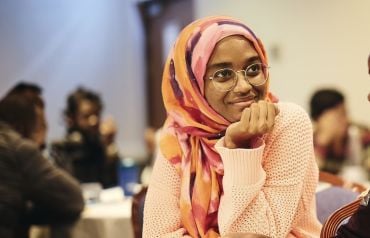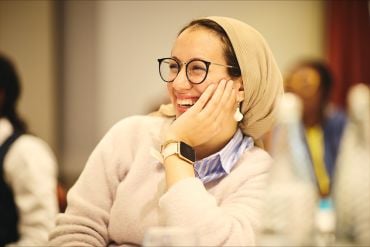
Africa’s change-makers: meet the Mastercard Foundation Scholars with big ambitions for the future
By 2050 the majority of the world’s student age population will be in Africa. African graduates and researchers will play a key role in contributing to the future of not just the continent, but the world.
Here we meet some of the 2024/25 Mastercard Foundation Scholars Program students at the University of Oxford under the Africa Oxford Initiative (AfOx), which aims to increase the number of African students pursuing postgraduate degrees here. These outstanding Mastercard Foundation Scholars are all receiving full scholarships for a rigorous one-year taught postgraduate course, leadership and impact programme, entrepreneurship support and networking opportunities.
The scholarship supports Mastercard Foundation Scholars before, during and following their time at Oxford including developing a lifelong network of Mastercard Foundation Scholars Program Alumni who collectively will rise to meet Africa’s challenges and opportunities.

Fidelity Ndali, from Zimbabwe, is pursuing an MSc in Modelling for Global Health at the Nuffield Department of Medicine, and is a member of Kellogg College. He graduated with First Class Honours in Applied Mathematics with Economics from the University of Zimbabwe and is interested in the role that mathematical and economic modelling can play in informing public health policy in low and middle-income countries, particularly for infectious diseases.
After completing his MSc, Fidelity plans to collaborate with NGOs and other organisations on global health research projects. He aims to pursue a PhD, with the long-term goal of translating complex modelling results into practical policy solutions, particularly for the African region.

Nashwa graduated from the University of Khartoum and is the founder of Fadfada, a mental health provider startup for provides remote online therapy. Her work focuses on bridging the gender gap in the workforce by partnering primarily with female psychologists. Through collaborations with local and international organisations, including the World Health Organization, Fadfada provides therapy to survivors of violence during the Sudanese revolution and ongoing conflicts.
After completing her studies at Oxford, Nashwa plans to use evidence-based approaches to combat mental health stigma and develop culturally sensitive interventions. She aims to leverage technology to transform mental health services in Sudan, across Africa, and globally.

Before joining Oxford, Kendi worked at the Shamiri Institute, a mental health organisation in Kenya, where she led efforts to expand mental health services. This included organising the 2-23 Arts and Policy Summit, which brought together government and other key stakeholders and helped to deliver mental health services to over 25,000 young people.
Kendi is also the founder of two youth initiatives, Busara Leaders Lab and Peer Connect, which focus on addressing unemployment and poverty in Kenya.
After completing her studies at Oxford, Kendi intends to pursue doctoral research in Development Studies. She aims to continue her work in integrating indigenous knowledge and community well-being interventions with digital solutions in Africa.

Mtendere graduated from the Malawi University of Science and Technology with a BSc in Medical Imaging. She has worked as a radiography intern in all major referral hospitals in Malawi, where she has contributed to improving precise patient diagnoses using various imaging modalities, such as X-ray, Computed Tomography (CT), and Ultrasound.
Her research interests include radiation oncology, particularly in Low- and Middle-Income Countries (LMICs), how the immune system and proper nutrition can enhance the effects of ionising radiation on cancer cells, with a focus on improving radiosensitivity in cervical cancer caused by the Human Papilloma Virus (HPV).
Mtendere’s goal is to become a leading medical physicist. She aims to apply the knowledge she gains at Oxford to advance diagnostic and therapeutic precision in radiation oncology in Malawi.

Ali graduated with first-class honours in civil engineering from the University of Khartoum and is the Co-Founder of the Young Water Professionals - Sudan Chapter, supported by the International Water Association. His professional experience includes working as a Water Resources Engineer at Newtech Consulting Group, where he addressed environmental challenges across Africa and the Middle East and North Africa (MENA) region. Ali has also served as a Teaching Assistant at the University of Khartoum, focusing on water and environmental engineering.
After completing his studies at Oxford, Ali plans to focus on research-based consultancy to develop strategies addressing water crises in African countries. He aims to improve water access and security through community engagement, ensuring that local voices are central to the planning process, enhancing resilience, and reducing water-related conflicts.

Reem holds an MSc in Development Studies from the University of the Western Cape, South Africa, where she was a Mandela Rhodes Scholar. She is a pharmacist with extensive experience in health systems strengthening, health policy, women's health, and climate change.
She is a fellow at the Universal Health Coverage and Health Systems (UHS) Department at the World Health Organization's Regional Office for the Eastern Mediterranean, where she works on climate change and health projects across 22 countries. She has also contributed to Egypt's Universal Health Coverage efforts during her four years with the Egypt Healthcare Authority, focusing on policy, management, and research.
Reem is committed to advancing global health, addressing health inequities, and tackling climate change through advocacy, policy, and research in Egypt and across Africa.
About Africa Oxford Initiative (AfOx)
Africa Oxford Initiative (AfOx) is an institution-wide academic network based in the University of Oxford. AfOx’s vision is to make engagement with Africa a strategic priority for the University of Oxford. AfOx facilitates equitable, impactful and sustainable collaborations between Oxford and African institutions through its education, research and innovation programs.
For more information visit www.afox.ox.ac.uk.
 Africa’s change-makers: meet the Mastercard Foundation Scholars with big ambitions for the future
Africa’s change-makers: meet the Mastercard Foundation Scholars with big ambitions for the future A green fuels breakthrough: bio-engineering bacteria to become ‘hydrogen nanoreactors’
A green fuels breakthrough: bio-engineering bacteria to become ‘hydrogen nanoreactors’ Oxford's student voices at COP29
Oxford's student voices at COP29 Teaching the World’s Future Leaders
Teaching the World’s Future Leaders  A blueprint for sustainability: Building new circular battery economies to power the future
A blueprint for sustainability: Building new circular battery economies to power the future Oxford citizen science project helps improve detection of antibiotic resistance
Oxford citizen science project helps improve detection of antibiotic resistance The Oxford students at the forefront of the fight against microbial resistance
The Oxford students at the forefront of the fight against microbial resistance  The hidden cost of AI: In conversation with Professor Mark Graham
The hidden cost of AI: In conversation with Professor Mark Graham  Astrophoria Foundation Year: Dr Jo Begbie reflects on the programme’s first year
Astrophoria Foundation Year: Dr Jo Begbie reflects on the programme’s first year